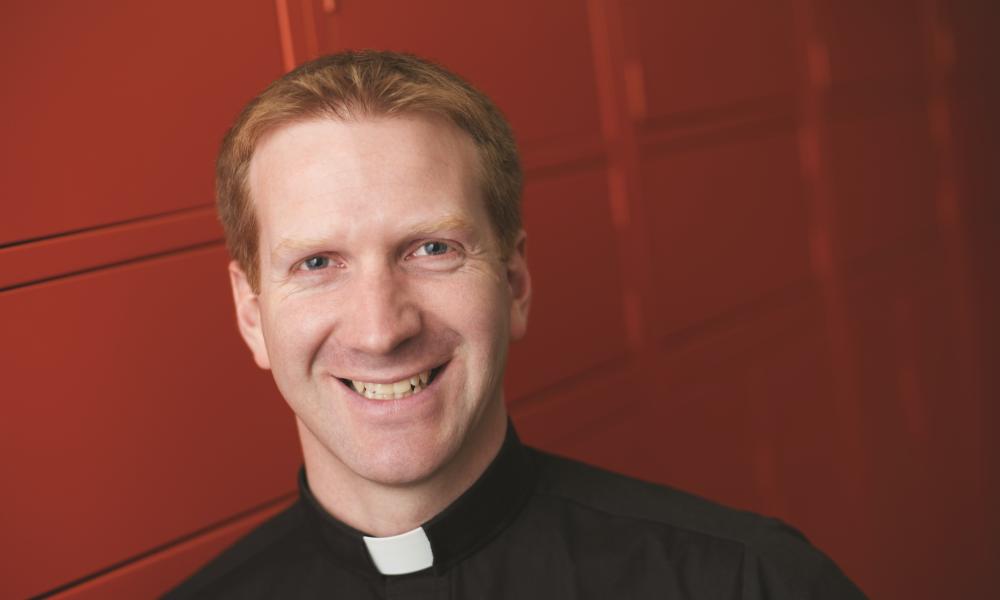
Chaplains in the high school hallways
Four priests at four Catholic schools
FAITH talked to the chaplains at the four Diocese of Lansing Catholic high schools to ask them about teens and their relationships – with each other and with God. Read more about how these priests help prepare students for dating and marriage.
Father Dan Kogut
How do you reach out to the students at Flint Powers High School? Being present in everyday activities is big. Being on the sidelines at games, praying with them before their events, going to band concerts and theater performances, eating lunch with them – they want to have someone involved in their world. That’s how they get to know me, trust me and open up to me. I don’t pry into their lives, but, in the ministry of presence, they know you’re available to them when they need to talk.
How does a Catholic education benefit the students in their relationships? Being at a Catholic school means you have freedom. We won’t shove the Catholic teachings down your throat, but we do teach what Jesus and his Church teach. But we can talk about the Theology of the Body and sex, as opposed to just the health and physiological aspects of it. We can talk about God’s plan.
When you tell high school girls that God wants a man for you who will sacrifice for you and that God wants you to have an amazing husband, they’re overwhelmed. So often, they’re settling for a counterfeit. It feels like love, but it isn’t love.
And the guys want to know there is someone out there for them who respects them, and they want to be the kind of man who is faithful and true. At their core, guys want to be honorable.
So, not only can we talk about sexuality in terms of God’s plan, but there is support in place, and role models, and peers who are honoring God in their relationships.
Father Dan Kogut is the chaplain at Flint Powers High School.
Father Gordon Reigle
What is the most common type of relationship for which students seek advice? I suppose that I hear about family issues most frequently. It seems as if the pace of student life increases each year: more demands, more sports practices, more of everything. Coupled with the teenage desire for freedom and independence, which is all part of forming an identity distinct from parents and siblings, the stress from living up to these high expectations inevitably leads to conflict in the home, most of all with parents.
When counseling teens with issues in romantic relationships, do you try to address chastity or marriage preparation issues? This is a perennial favorite. I seek to remind teens that they are years away from marriage, will meet all sorts of interesting people at college and beyond and will likely go through several relationships before discerning the right person to marry. Instead of “dating,” I encourage students to socialize with larger groups of friends – keep it public and transparent; avoid pairing off and spending time alone and meet lots of people so that you can learn to socialize well and evaluate the qualities you appreciate in a potential future spouse.
What one piece of advice or counsel do you offer to all teens with relationship issues? I encourage students to keep their future spouse in mind. It is very hard to “be good for goodness sake.” If you give a piece of your heart away to every romantic interest that comes along, you will be giving the leftovers to your spouse, and who wants leftovers?
Father Gordon Reigle is the chaplain at Lansing Catholic High School.
Father Richard Lobert
What are some of the challenges teens face at your school? Self-image is a big one. Among our young women, their appearance is so critical. There is so much in our media that places demands on how they look and whether they meet certain standards.
I think fathers have a huge role with their daughters in that respect because they need to say, “You are worthy of love. You are beautiful the way you are.” That masculine affirmation goes far in helping them feel loved.
And with the boys, they go through different growth spurts, and the emphasis on athletics in our society – on size and strength as a measure of masculinity – is so great that our students often feel their self-worth is valued on their physical prowess.
What type of advice would you give to teens suffering through these issues? A huge step is making them aware of the great love of God. How is God active in your life? How have you seen him respond to your needs? Teenagers will share some of their faith that maybe they don’t think is strong on its own, but when others speak or when I can listen, they realize they’re not alone. There is suddenly a sense of awareness of God’s love and presence in their lives.
They’re not at a stage where they are ready to select their life partner, and there are kinds of behavior reserved more properly for older, more mature people. Too often, young people don’t have the wisdom and maturity to know how to handle themselves when their attraction gets so strong.
How does a Catholic education help teens value what’s important in their relationships? We try to create an environment that pleases Jesus. Whether that’s how they dress, how they pray, how they interact with each other – we use the standard of the Gospel. Being in this environment, and even after hours because they’re still with their peers from this school, it really does help to lessen some of the pressures the world wants to bring to bear upon them.
Father Richard Lobert is the chaplain and a theology teacher at Father Gabriel Richard High School in Ann Arbor.
Father Geoff Rose
What are the most common relationship issues students seek advice for? I find that most common relationship problems I hear are family relationship problems. They range widely, but often are tied to the tensions between the student trying to assert their independence and family members seeing it differently.
What kind of advice or counsel do you try to offer for those common problems? I stress that this tension is quite normal. I want the student to see how the tension is created. That the student is charging forward to leave the nest and the family response is to slow them down, for their own safety/good. Also, to be patient, as this tension is not always how it will be, or how they will feel. I strongly encourage them to communicate their apologies when they speak out in hurtful ways. Even when all parties know why this tension exists, it helps to communicate how you really feel.
What advice seems to resonate most with students? That they are normal! Also, to communicate their feelings and to be honest.
What kind of approach do you take when offering counsel to students – are you more or less direct than you might be with adults? Why? I treat my students with as much respect as adults, and am as direct. Most students appreciate this, as it is how they want to be seen/treated. If the students don’t like that approach, I tell them (with a loving smile) that this is how adults communicate.
When counseling teens with issues in romantic relationships, do you try to address chastity or marriage preparation issues? I always make a point of showing the wisdom of chastity – chastity meaning purity, not just abstaining from sex. As students share various problems, I can gently point out how a chaste person doesn’t encounter these problems. They have other problems, sure, but the can avoid a lot of headaches, heartaches and hurt feelings by living a chaste life. Whether it is in how they speak or how they act – all aspects.
Father Geoff Rose, OSFS, is the chaplain at Jackson Lumen Christi High School.



